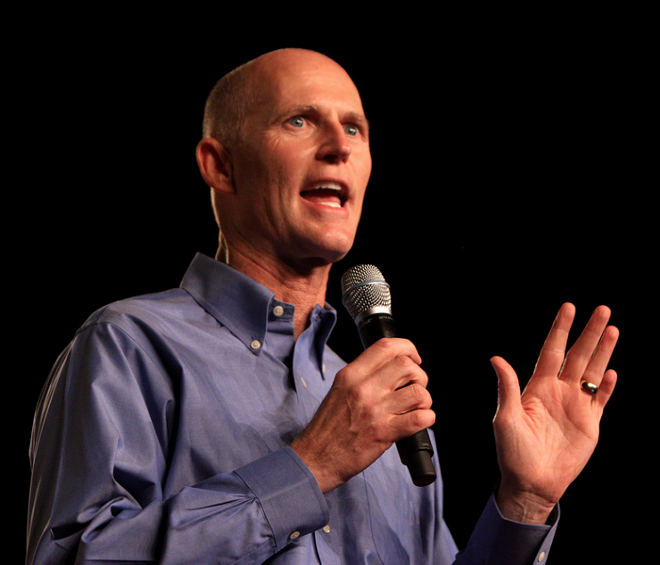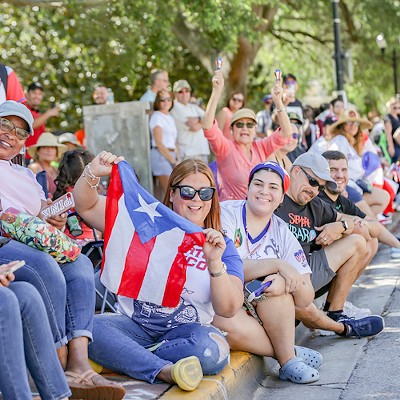Rick Scott wants to choose new Supreme Court justices with Florida's next governor
By Lloyd Dunkelberger, News Service of Florida on Wed, Oct 31, 2018 at 5:34 pm
In another move in a closely watched case, Gov. Rick Scott is asking the Florida Supreme Court to allow him and the newly elected governor to jointly appoint three justices to the state’s highest court.
Scott wants the court to modify an Oct. 15 order that gave the “sole authority” for those Supreme Court appointments to the winner of Tuesday’s gubernatorial election between Republican Ron DeSantis and Democrat Andrew Gillum.
In a brief filed Tuesday night, Scott’s lawyers asked the court to grant a rehearing and to “clarify” the order, which said the new governor, who will take office on Jan. 8, has the authority to appoint replacements for justices Barbara Pariente, R. Fred Lewis and Peggy Quince. The three longtime justices will leave the court in January because they have reached a mandatory retirement age.
The Supreme Court will hear arguments Nov. 8 on the timing of a Supreme Court Judicial Nominating Commission decision to certify a list of potential new justices from a pool of 59 lawyers and judges who have applied for the upcoming vacancies.
The nominating commission is scheduled to interview all the applicants over a period of four days, Saturday and Sunday in Miami, and Nov. 8 and Nov. 9 in Tampa.
In another legal filing last week, the League of Women Voters of Florida and Common Cause, the groups that originally challenged Scott’s decision to involve himself in the appointments, have asked the court to order reopening the application process with a deadline of no earlier than Jan. 8.
In the governor’s brief, his lawyers are asking the court to strike the language from the Oct. 15 order that gave the “sole authority” for the appointments to the new governor.
The original challenge filed by the League of Women Voters and Common Cause, which sought to block the governor’s actions through a legal procedure known as a writ of quo warranto, was “directed entirely” to the nomination process and not the governor’s appointment powers, the brief said.
“The Oct. 15 order appears to have overlooked or misapprehended the distinction between the nomination and appointment processes,” the governor’s brief said. “Only certain discrete aspects of the nomination process have been challenged via a petition for quo warranto in this proceeding.”
In addition to striking the “sole authority” language, the governor’s lawyers want the court to expand on provisions in the Oct. 15 order that noted Scott could make the appointments if the justices left before their terms expired or if the new governor failed to take office at midnight between Jan. 7 and Jan. 8.
None of the justices have indicated they plan to step down before their terms expire on Jan. 8. And the winner of the governor’s race is expected to take the oath of office prior to inauguration day, effectively beginning his term at midnight on Jan. 8 when the justices’ terms expire.
The governor’s lawyers want the court to acknowledge “another circumstance” under which Scott could make the appointments “with the concurrence of the governor-elect.”
The brief cites the precedent of Gov. Lawton Chiles and incoming Gov. Jeb Bush agreeing on the appointment of Quince in 1998. Chiles made the appointment on Dec. 11 under the agreement with Bush, who did not take office until January 1999.
Scott’s lawyers noted it “was precisely those circumstances” that the governor invoked when he directed the Supreme Court Judicial Nominating Commission to accept applicants for the upcoming court vacancies and to certify a list of potential justices by Nov. 10, with the argument it would avoid a prolonged court vacancy.
“The governor’s expectation is that he and the governor-elect — like Gov. Chiles and then Gov.-elect Bush — will agree on the selection of three justices who will serve with distinction,” the brief said, quoting a press release from Scott’s office about the appointment process.
But the League of Women Voters and Common Cause filed a response Wednesday that argued the Supreme Court should reject Scott's request for rehearing. The filing said the governor's request is, "at bottom, just the latest in a long line of attempts to further control the judicial nominating process and taint it with his partisan policy preferences."
"In any event, Governor Scott still points to no provision in the Florida Constitution, no statute, and no case law for the remarkable suggestion that two different governors must share the power to appoint judges under certain circumstances," attorneys for the League of Women Voters and Common Cause wrote. "The exercise of solemn constitutional duties like this should not be fodder for back-room political dealing. While the person elected governor on November 6 is certainly free to consult with Governor Scott (or anyone else for that matter) as to how to exercise his appointment power, there is no legal requirement that he do so."
The Supreme Court appointments are drawing heavy scrutiny because they could shift the ideological direction of the state’s highest court for years to come.
Pariente, Lewis and Quince are part of a liberal bloc, which now holds a slim 4-3 majority on the seven-member court. They have helped thwart Scott and the Republican-dominated Legislature on numerous occasions since the governor took office in 2011.
Scott wants the court to modify an Oct. 15 order that gave the “sole authority” for those Supreme Court appointments to the winner of Tuesday’s gubernatorial election between Republican Ron DeSantis and Democrat Andrew Gillum.
In a brief filed Tuesday night, Scott’s lawyers asked the court to grant a rehearing and to “clarify” the order, which said the new governor, who will take office on Jan. 8, has the authority to appoint replacements for justices Barbara Pariente, R. Fred Lewis and Peggy Quince. The three longtime justices will leave the court in January because they have reached a mandatory retirement age.
The Supreme Court will hear arguments Nov. 8 on the timing of a Supreme Court Judicial Nominating Commission decision to certify a list of potential new justices from a pool of 59 lawyers and judges who have applied for the upcoming vacancies.
The nominating commission is scheduled to interview all the applicants over a period of four days, Saturday and Sunday in Miami, and Nov. 8 and Nov. 9 in Tampa.
In another legal filing last week, the League of Women Voters of Florida and Common Cause, the groups that originally challenged Scott’s decision to involve himself in the appointments, have asked the court to order reopening the application process with a deadline of no earlier than Jan. 8.
In the governor’s brief, his lawyers are asking the court to strike the language from the Oct. 15 order that gave the “sole authority” for the appointments to the new governor.
The original challenge filed by the League of Women Voters and Common Cause, which sought to block the governor’s actions through a legal procedure known as a writ of quo warranto, was “directed entirely” to the nomination process and not the governor’s appointment powers, the brief said.
“The Oct. 15 order appears to have overlooked or misapprehended the distinction between the nomination and appointment processes,” the governor’s brief said. “Only certain discrete aspects of the nomination process have been challenged via a petition for quo warranto in this proceeding.”
In addition to striking the “sole authority” language, the governor’s lawyers want the court to expand on provisions in the Oct. 15 order that noted Scott could make the appointments if the justices left before their terms expired or if the new governor failed to take office at midnight between Jan. 7 and Jan. 8.
None of the justices have indicated they plan to step down before their terms expire on Jan. 8. And the winner of the governor’s race is expected to take the oath of office prior to inauguration day, effectively beginning his term at midnight on Jan. 8 when the justices’ terms expire.
The governor’s lawyers want the court to acknowledge “another circumstance” under which Scott could make the appointments “with the concurrence of the governor-elect.”
The brief cites the precedent of Gov. Lawton Chiles and incoming Gov. Jeb Bush agreeing on the appointment of Quince in 1998. Chiles made the appointment on Dec. 11 under the agreement with Bush, who did not take office until January 1999.
Scott’s lawyers noted it “was precisely those circumstances” that the governor invoked when he directed the Supreme Court Judicial Nominating Commission to accept applicants for the upcoming court vacancies and to certify a list of potential justices by Nov. 10, with the argument it would avoid a prolonged court vacancy.
“The governor’s expectation is that he and the governor-elect — like Gov. Chiles and then Gov.-elect Bush — will agree on the selection of three justices who will serve with distinction,” the brief said, quoting a press release from Scott’s office about the appointment process.
But the League of Women Voters and Common Cause filed a response Wednesday that argued the Supreme Court should reject Scott's request for rehearing. The filing said the governor's request is, "at bottom, just the latest in a long line of attempts to further control the judicial nominating process and taint it with his partisan policy preferences."
"In any event, Governor Scott still points to no provision in the Florida Constitution, no statute, and no case law for the remarkable suggestion that two different governors must share the power to appoint judges under certain circumstances," attorneys for the League of Women Voters and Common Cause wrote. "The exercise of solemn constitutional duties like this should not be fodder for back-room political dealing. While the person elected governor on November 6 is certainly free to consult with Governor Scott (or anyone else for that matter) as to how to exercise his appointment power, there is no legal requirement that he do so."
The Supreme Court appointments are drawing heavy scrutiny because they could shift the ideological direction of the state’s highest court for years to come.
Pariente, Lewis and Quince are part of a liberal bloc, which now holds a slim 4-3 majority on the seven-member court. They have helped thwart Scott and the Republican-dominated Legislature on numerous occasions since the governor took office in 2011.

WE LOVE OUR READERS!
Since 1990, Orlando Weekly has served as the free, independent voice of Orlando, and we want to keep it that way.
Becoming an Orlando Weekly Supporter for as little as $5 a month allows us to continue offering readers access to our coverage of local news, food, nightlife, events, and culture with no paywalls.
Scroll to read more Orlando Area News articles
Newsletters
Join Orlando Weekly Newsletters
Subscribe now to get the latest news delivered right to your inbox.


















